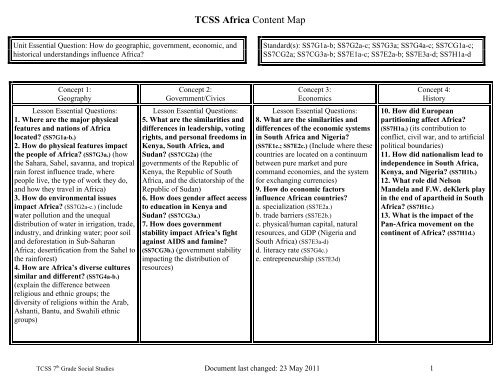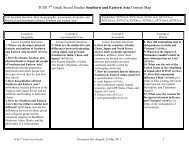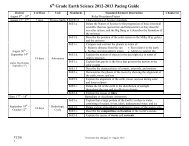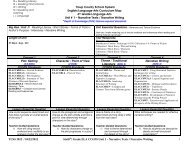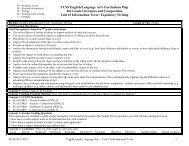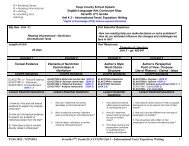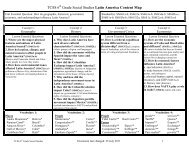Africa - Troup 6-12 Teacher Resources
Africa - Troup 6-12 Teacher Resources
Africa - Troup 6-12 Teacher Resources
Create successful ePaper yourself
Turn your PDF publications into a flip-book with our unique Google optimized e-Paper software.
Unit Essential Question: How do geographic, government, economic, and<br />
historical understandings influence <strong>Africa</strong>?<br />
Concept 1:<br />
Geography<br />
Lesson Essential Questions:<br />
1. Where are the major physical<br />
features and nations of <strong>Africa</strong><br />
located? (SS7G1a-b.)<br />
2. How do physical features impact<br />
the people of <strong>Africa</strong>? (SS7G3a.) (how<br />
the Sahara, Sahel, savanna, and tropical<br />
rain forest influence trade, where<br />
people live, the type of work they do,<br />
and how they travel in <strong>Africa</strong>)<br />
3. How do environmental issues<br />
impact <strong>Africa</strong>? (SS7G2a-c.) (include<br />
water pollution and the unequal<br />
distribution of water in irrigation, trade,<br />
industry, and drinking water; poor soil<br />
and deforestation in Sub-Saharan<br />
<strong>Africa</strong>; desertification from the Sahel to<br />
the rainforest)<br />
4. How are <strong>Africa</strong>’s diverse cultures<br />
similar and different? (SS7G4a-b.)<br />
(explain the difference between<br />
religious and ethnic groups; the<br />
diversity of religions within the Arab,<br />
Ashanti, Bantu, and Swahili ethnic<br />
groups)<br />
TCSS <strong>Africa</strong> Content Map<br />
Concept 2:<br />
Government/Civics<br />
Lesson Essential Questions:<br />
5. What are the similarities and<br />
differences in leadership, voting<br />
rights, and personal freedoms in<br />
Kenya, South <strong>Africa</strong>, and<br />
Sudan? (SS7CG2a) (the<br />
governments of the Republic of<br />
Kenya, the Republic of South<br />
<strong>Africa</strong>, and the dictatorship of the<br />
Republic of Sudan)<br />
6. How does gender affect access<br />
to education in Kenya and<br />
Sudan? (SS7CG3a.)<br />
7. How does government<br />
stability impact <strong>Africa</strong>’s fight<br />
against AIDS and famine?<br />
(SS7CG3b.) (government stability<br />
impacting the distribution of<br />
resources)<br />
Standard(s): SS7G1a-b; SS7G2a-c; SS7G3a; SS7G4a-c; SS7CG1a-c;<br />
SS7CG2a; SS7CG3a-b; SS7E1a-c; SS7E2a-b; SS7E3a-d; SS7H1a-d<br />
Concept 3:<br />
Economics<br />
Lesson Essential Questions:<br />
8. What are the similarities and<br />
differences of the economic systems<br />
in South <strong>Africa</strong> and Nigeria?<br />
(SS7E1c.; SS7E2c.) (Include where these<br />
countries are located on a continuum<br />
between pure market and pure<br />
command economies, and the system<br />
for exchanging currencies)<br />
9. How do economic factors<br />
influence <strong>Africa</strong>n countries?<br />
a. specialization (SS7E2a.)<br />
b. trade barriers (SS7E2b.)<br />
c. physical/human capital, natural<br />
resources, and GDP (Nigeria and<br />
South <strong>Africa</strong>) (SS7E3a-d)<br />
d. literacy rate (SS7G4c.)<br />
e. entrepreneurship (SS7E3d)<br />
Concept 4:<br />
History<br />
10. How did European<br />
partitioning affect <strong>Africa</strong>?<br />
(SS7H1a.) (its contribution to<br />
conflict, civil war, and to artificial<br />
political boundaries)<br />
11. How did nationalism lead to<br />
independence in South <strong>Africa</strong>,<br />
Kenya, and Nigeria? (SS7H1b.)<br />
<strong>12</strong>. What role did Nelson<br />
Mandela and F.W. deKlerk play<br />
in the end of apartheid in South<br />
<strong>Africa</strong>? (SS7H1c.)<br />
13. What is the impact of the<br />
Pan-<strong>Africa</strong> movement on the<br />
continent of <strong>Africa</strong>? (SS7H1d.)<br />
TCSS 7 th Grade Social Studies Document last changed: 23 May 2011 1
Vocabulary 1:<br />
Sahara Sahel<br />
savanna tropical rainforest<br />
Congo River Niger River<br />
Nile River Lake Tanganyika<br />
Lake Victoria Atlas Mountains<br />
Kalahari Desert Egypt<br />
Kenya Nigeria<br />
South <strong>Africa</strong><br />
Sudan<br />
Democratic Republic of the Congo (Zaire)<br />
ethnic group<br />
religious group<br />
Arab<br />
Muslim<br />
Bantu<br />
Swahili<br />
Ashanti<br />
Christianity<br />
inanimate object<br />
desertification<br />
deforestation<br />
scarcity<br />
unequal distribution<br />
Human capital (education/training)<br />
Natural Resource (oil)<br />
Population distribution<br />
TCSS <strong>Africa</strong> Content Map<br />
Vocabulary 2:<br />
Parliamentary democracy<br />
Monarchy<br />
Republic<br />
dictatorship<br />
Constitutional Monarchy<br />
Federal Republic<br />
Republic of Kenya<br />
Republic of South <strong>Africa</strong><br />
Republic of Sudan<br />
Voting rights<br />
Personal freedoms<br />
AIDS<br />
famine<br />
Unitary**<br />
Confederation**<br />
Federal**<br />
Autocratic**<br />
Oligarchic**<br />
Democratic – parliamentary,<br />
presidential**<br />
monarch**<br />
President**<br />
Prime minister**<br />
** Taught throughout each unit<br />
<strong>Teacher</strong> Information to include during lesson<br />
Vocabulary 3:<br />
Nigeria<br />
South <strong>Africa</strong><br />
Diamonds<br />
Gold<br />
Uranium<br />
Oil<br />
standard of living<br />
literacy rate<br />
Gross Domestic Product (GDP)<br />
Pure market**<br />
Pure command**<br />
Mixed economy**<br />
Continuum**<br />
Specialization**<br />
Trade barriers**<br />
Tariffs**<br />
Quotas**<br />
Embargos**<br />
Exchange rates**<br />
Currency**<br />
Human capital (education/training)**<br />
Gross Domestic Product (GDP)**<br />
Investment**<br />
Capital (factories, machinery, and<br />
technology)**<br />
Entrepreneurship**<br />
Vocabulary 4:<br />
Partitioning<br />
Nationalism<br />
Apartheid<br />
Pan-<strong>Africa</strong>n movement<br />
Nelson Mandela<br />
F.W. deKlerk<br />
South <strong>Africa</strong><br />
Kenya<br />
Nigeria<br />
Artificial boundaries<br />
TCSS 7 th Grade Social Studies Document last changed: 23 May 2011 2


